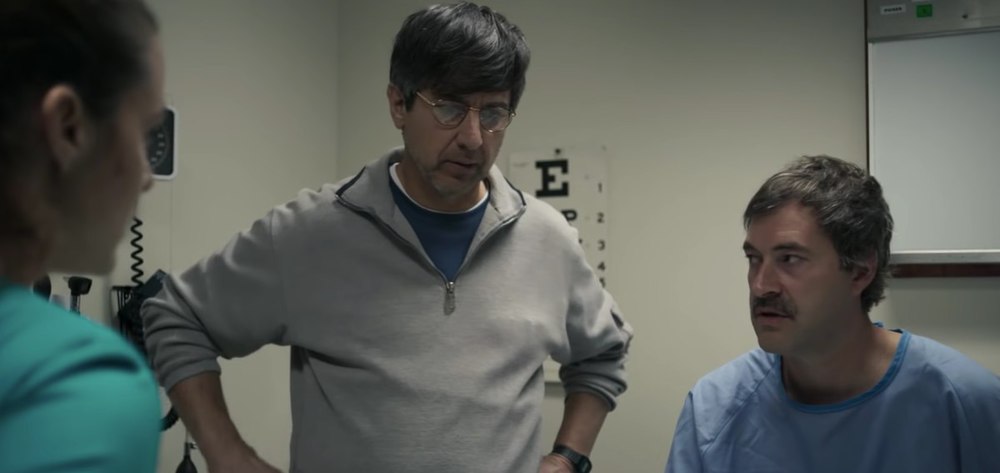
Death is real
Someone’s there and then they’re not
And it’s not for singing about
It’s not for making into art
If you’ve read anything of mine recently, you probably know that Phil Elverum has been a prism through which I’ve seen a lot of art refracted. The above words in particular were rattling around my head as I watched Paddleton. How do we tackle something as insurmountable as death? It’s not an abstraction, not a theme or metaphor, not a catalyst for pie-in-the-sky poetry or heart-wrenching melodrama. It simply is, for better or worse; this dumb inevitability that’s at once ubiquitous and unspeakable, stale and profound. There’s nothing more insufferable in the world than to write about dying: entire wardrobes have been erected around phrases like “dumb inevitability.” But there’s also nothing more human in the world than to fear it, to witness it, to eventually live it. It’s the hack Lifetime Original premise that unites us all, a territory more well-trod than any three-chord breakup song: someone’s there and, then, they’re not.
When it comes to art that wrestles with the subject, there’s a razor-thin edge between “exploitative” and “profound.” And like romantic vs pornographic or darkly comedic vs offensive, it can only really be defined in subjective terms. Some films tackle mortality head-on, full of sentiment and transparent motive, and I fall in love at first sight. Others, no less earnest, leave me feeling angry and manipulated. Some opt for a subtler approach, and I roll my eyes at the faux pretension. With others, that same subtlety hits me like a tidal wave.
What I love about Paddleton is that it carves out a new path, one that’s both achingly direct and allergic to drama. In keeping with the Duplass Brothers’ aesthetic, the film—starring Mark Duplass and Ray Romano, directed by Alex Lehmann—has that lax, bullet-points-and-improv vibe that will either delight or infuriate depending on your tolerance for the genre. When Michael (Duplass) learns he has terminal cancer, he resolves to end his life on his own terms. Soon after, he and his best/only friend Andy (Romano) take a road trip to the nearest pharmacy that’s willing to provide physician-assisted suicide medication, a little drug store in Solvang. But don’t let the destination fool you: there are no Sideways hijinks to be had here, no off-the-rails moments or third act twist. There isn’t even much of a road trip, really, at least not in the cinematic sense. The friends simply drive to get his medication, have a few drinks, sleep, drive back, and…well, I won’t officially spoil it, but you can fill in the blanks.
It’s tempting to say that Paddleton is carried entirely by its final 20 minutes—like the similarly-paced Jeff Who Lives At Home or Safety Not Guaranteed, it swings for the emotional fences and knocks it out of the park. These are some of the most gorgeous, humanistic moments I’ve seen on screen in a long time, and both leads act the hell out of it. But the truth is that the trick only works—only avoids crossing that line—because of the nuanced character-building that precedes it. Whether huddled around a Kung Fu video, squabbling over the bill, or ruminating on “how bees see” and “sand-off” in the car, Romano and Duplass bring years of lived-in authenticity to their onscreen friendship. For my money, it’s the best either has ever been (and I’ve seen The Big Sick). We believe both their deep, platonic love and its clumsy expression: we’ve seen them before; we’ve maybe even been them. And that space for self-identification is precisely where the Duplass’s freewheeling style shines, giving us a window into the mundane, everyday-ness of its leads. As we see ourselves reflected in their banal eccentricities, the elephant in the room grows more tangible, somehow. Michael is a real person, and he is really going to die. So is Andy. So am I. So are you.
We know all of this, of course. We’ve seen it on screen, too, in countless iterations. But Paddleton resides in the space between soundtrack cues, in a way that few others manage. It argues that buried between shots of a foreboding test result, tearful embrace, EKG flatlining, and shovel in the dirt, there are months (often years) of boring, joyous, ridiculous, silly life left to live. Movies still help pass the time; home-made pizza still tastes good; the so-unfunny-they’re-funny jokes still…well, are. The world spins madly on, tinted by that “dumb inevitability” but only just a notch. When the tears finally do come—and, oh, did they for me—they feel different against that backdrop. Like mourning, celebration, and pride rolled into one.
For communicating all this with humor and grace, Paddleton is getting nothing but my love. And it’s on Netflix right this second. Get a good pair of headphones, steel yourself for a cry, and thank me later. Or hear Chris and me discuss it in Episode 547 of The Spoiler Warning.